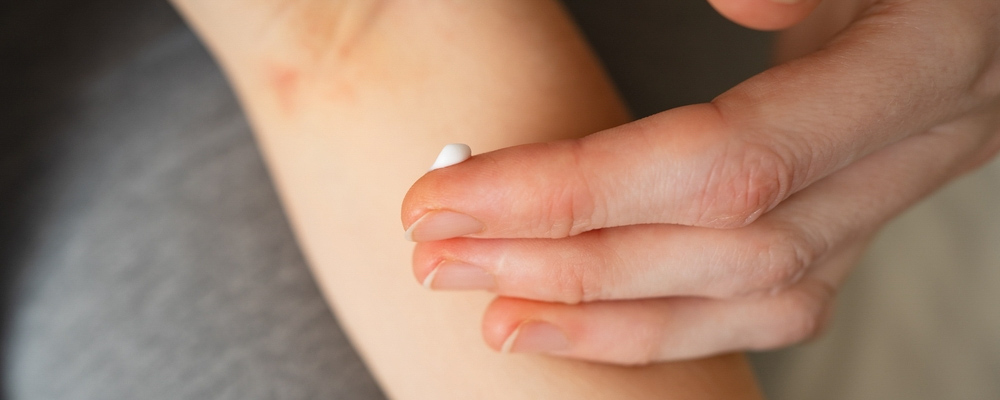Updated on January 30, 2023
Introduction:
Atopic dermatitis is a skin condition characterized by inflamed, itchy, cracked, and rough patches of skin. Clinical atopic dermatitis presents itself with skin dryness, erythema, oozing and crusting, and lichenification. Atopic dermatitis has no cure, but it can be managed with medications. Treatment goals include reducing symptoms (pruritus and dermatitis), preventing exacerbations, and minimizing therapeutic risks.
Topical calcineurin inhibitors appear to be one of the most promising systemic and topical options for treating atopic dermatitis. They are beneficial in the long-term management and prevention of atopic dermatitis.
This blog will describe atopic dermatitis and goes over its symptoms, topical calcineurin inhibitors, and treating atopic dermatitis.
What is Atopic Dermatitis (Eczema)?
Eczema or Atopic Dermatitis is a skin condition that causes dry, itchy, and bumpy skin. This condition weakens your skin’s barrier function, which is responsible for retaining moisture and protecting your body from external factors.
Atopic dermatitis is the medical term for eczema. Dermatitis is a group of skin inflammation conditions. Atopic dermatitis is not contagious, it cannot be transmitted from person to person.
Atopic dermatitis causes severe itching and scratching of the skin. Scratching causes swelling, redness, cracking, “weeping” clear fluid, crusting, and scaling. In most cases, there are flares when the disease is at its worst, followed by remissions when the skin improves or clears up completely.
Who is affected by Atopic Dermatitis?
Atopic dermatitis is a common disease that typically manifests itself during infancy and childhood. Many children’s atopic dermatitis resolves before the age of adolescence. Some children may continue to have symptoms as teenagers and adults. In some cases, the disease manifests during adulthood.
Eczema is more likely to develop if there is a family history of atopic dermatitis, hay fever, or asthma. Furthermore, it is believed that atopic dermatitis is more common in non-Hispanic black children and that women and girls are slightly more likely than men and boys to develop the disease.
How Prevalent is Atopic Dermatitis?
Eczema is a frequently diagnosed condition that affects more than 31 million Americans. Atopic dermatitis affects 10% to 20% of infants. However, nearly half of all infants diagnosed with eczema outgrow the condition or its symptoms improve significantly as they grow older.
Also read: What Causes Eczema Flare-ups?
What are the Symptoms of Atopic Dermatitis?
Eczema symptoms include:
- Dry skin
- Itching
- Skin rash
- Bumps on the skin
- Thick, leathery patches of skin
- Flaky, scaly, or crusty skin
- Swelling
Is Atopic Dermatitis an Autoimmune Disease?
Eczema is a chronic skin condition that shares some similarities to autoimmune skin diseases. The cause of atopic dermatitis is most likely a combination of factors, like genetics, a sensitive immune system, and environmental factors but it is not completely an autoimmune process.
Allergens such as house dust, mite droppings, certain foods, and pollen can trigger the immune system, but eczema often flares up with no obvious allergen. The immune system (particularly T cells) is overactive in atopic dermatitis, resulting in skin inflammation (red or darker patches, depending on the color of your skin).
The medications that target the immune system can be beneficial. Calcineurin inhibitors can help to suppress this over activity by acting on T-cells to dampen the immune system. This reduces inflammation and makes the skin less itchy.
How to Treat Atopic Dermatitis?
Treating and managing eczema can be difficult if the cause is uncontrollable, such as genetics. Fortunately, you may have some control over your surroundings and stress levels. Try to figure out what causes or worsens your eczema, and then avoid it. The goal is to reduce itching and discomfort while also preventing infection and further flare-ups.
Several medications are available to treat the symptoms of eczema, including:
-
Topical corticosteroid creams:
These are anti-inflammatory medications that should relieve the main symptoms of eczema, such as inflammation and itchiness. They are safe to use on the skin.
-
Oral medications:
If topical treatments are ineffective, a doctor may prescribe oral medications such as systemic corticosteroids or immunosuppressants. These are available as injections or as oral tablets. Your doctor might advise them for short periods of time. It is also important to note that if the person is not already taking another medication for the condition, the symptoms may worsen if the drugs are stopped.
-
Antibiotics:
If eczema is associated with a bacterial skin infection, doctors may prescribe antibiotics.
-
Antihistamines:
These cause drowsiness and can reduce the risk of nighttime scratching.
-
Topical calcineurin inhibitors:
This medication suppresses the immune system’s activity. It reduces inflammation and helps to prevent flare-ups.
-
Barrier repair moisturizers:
These work to repair the skin and reduce water loss.
-
Phototherapy:
It involves exposing oneself to UVA or UVB waves. This method is effective for treating mild dermatitis. Throughout the treatment, a doctor will keep a close eye on the skin.
-
Injected biologic drugs:
These medications block proteins in the immune system, limiting immune system response.
Even though the condition is not currently curable, people with eczema should consult with a doctor to get a personalized treatment plan. Even after an area of skin has healed, it is critical to maintaining its care because it can easily become irritated again.
Topical Calcineurin Inhibitors And Treating Atopic Dermatitis
The immune system is overactive when you have eczema. This results in inflammation and the appearance of red or discolored patches on your skin. Calcineurin inhibitors aid in the control of an overactive immune system. They tell your T cells to relax, which reduces inflammation. This relieves itching on your skin.
Topical calcineurin inhibitors (TCIs) are a type of treatment that affects your immune system. These therapies are “topical,” which means they are applied to the skin. The term “calcineurin inhibitor” refers to therapies that work with your immune system to prevent a specific chemical from causing eczema flares.
There are two types of TCIs. They can be used to treat or prevent flare-ups:
- Tacrolimus ointment (Protopic) is used to treat moderate to severe eczema.
- Pimecrolimus cream (Elidel) is used to treat mild to moderate eczema.
Apply a thin layer of TCI to the inflamed area. Repeat this twice a day until your eczema is gone. TCIs are prohibited to use on mucous membranes. This refers to the moist areas of your mouth, eyes, nose, and genitals.
Doctors usually recommend this type of therapy if other common eczema treatments, such as topical steroids, do not work well enough or have too many side effects. They may also advise you to combine TCIs with another treatment. As a result, experts consider TCIs to be “second-line” treatments for atopic dermatitis.
Tacrolimus and pimecrolimus are both effective for both short-term and long-term eczema treatment and prevention.
Takeaway:
Atopic dermatitis (eczema) is the most common chronic (long-term) disease that causes skin inflammation, redness, and irritation, making it itchy, dry and cracked. Genetics, the immune system, and the environment all play a role in the disease. Living with atopic dermatitis can be difficult, depending on the severity and location of the symptoms. Treatment can help control symptoms. One of the most promising systemic and topical options is topical calcineurin inhibitors for treating atopic dermatitis.





